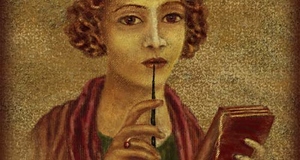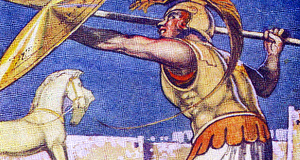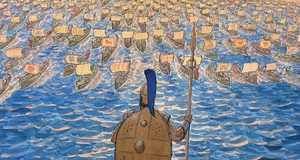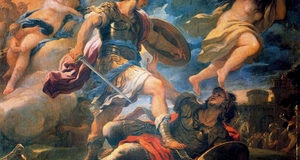The Dichotomy of Gender in Euripides' Bacchae
By
2015, Vol. 7 No. 10 | pg. 1/1
KEYWORDS:
In Euripides’ Bacchae, careful examination of the character Dionysus illuminates discrepancies in action based on gender. Ultimately, Dionysus’ effeminate nature compounded with his subversive measures toward women and male proclivities suggest an inherent duality. Dionysus’ vacillation between masculine and feminine tendencies characterizes him as a heteronormative embodiment of both males and females, in essence, a community or civilized society. However, since his duality also represents a loss of identity, one can deduce that the play advocates a pre-communal state of existence, wherein heteronormative identity has not yet come into existence. Agave is initially stripped of her free will when Dionysus uses supernatural means to rouse her, and her sisters, into a frenzy. Dionysus divulges these manipulative actions when he states, “…I myself stung those same sisters, hounding them from their homes with fits of frenzy…knocked out of their senses” (Euripides, 24, 32-4). His blatant usurpation of Agave’s power to act freely ultimately renders her helpless, thus relegating her to the pathetic status of a puppet. Upon entrancing Agave, Dionysus clouds her mental faculties and free will, thereby subjecting her to myriad untoward sequelae by virtue of her unchecked behavior. Agave consequently acts like a wild, savage automaton, subject to humiliation owing to chaotic behavior that occurs beyond her control. The relationship between Agave and Dionysus appears to be fueled by an imbalance between power and self-mastery, as Dionysus freely manipulates Agave in an unrestrained fashion so as to punish her for not accepting his divine status. Agave’s transformation is catalyzed by force rather than free will. Thus, Dionysus subverts the female persona and obliterates her agency as an individual and human being. In this sense, she becomes animalistic and slavish, her mental faculties rendered incapable of conscious consideration and decisive, free action. Dionysus employs hypnotic intoxication to despotically degrade Agave’s intrinsic capacity to think, thusdestroying her ability to reason and distinguish between appearance and reality. Ultimately, Agave is but a pawn, wholly susceptible to the deity’s vagaries. Dionysus uses indirect means to force this newly contrived erratic and violent identity upon Agave so as to coerce her into committing unthinkable, gruesome actions. Rather than artfully using language to rectify Agave’s insolent “irreverence” and assert his divine status, Dionysus instead resorts to mentally intoxicating machinations that ignominiously culminate in filicide. For instance, Dionysus, “the Bacchic god,” evidently exercises considerable influence over Agave’s actions, driving her to repudiate her son’s desperate entreaties for mercy before his mutilation:
Dionysus removes Agave from the realm of knowledge and enhances her internal irrational element, thereby depriving her of free will. The female is relegated to the status of object, molded and shaped by the male, Dionysus. Therefore, there is a sense of appropriation and subjugation implied through Dionysus’ actions. The deity effectively perverts her sense of choice, exercising his forceful dominance to will Agave to do as he pleases. In the play, Dionysus’ exercise of force towards Agave contrasts with his predilection for free will when concerning Pentheus. In the following passage, Dionysus, in the guise of a stranger, interacts with the hot-tempered Pentheus:
Dionysus warns and rattles Pentheus, imbuing him with fear to catalyze acknowledgement of Dionysus’ divinity. Essentially, Dionysus attempts to elicit such recognition not by coercive measures, such as force, but, rather, by sparking Pentheus’ will. Dionysus appeals to Pentheus to act out of his own volition to realize Dionysus’ true nature by disguising himself. Rather than subverting Pentheus, Dionysus provokes his mental faculties. This treatment of the male, Pentheus, poignantly contrasts with Dionysus’ treatment of the female, Agave. Moreover, Dionysus’ behavior towards the female appears to be guided by irrational, discriminatory tendencies rather than by a rational objectivity. The values that appear to motivate Dionysus are strikingly provincial and partial towards males, suggesting dominance of male over female. However, this notion of subverting females and converting them into his followers while favoring the male is countered by Dionysus’ effeminate nature. For instance, Pentheus addresses Dionysus, who is disguised as a stranger, and opines on the latter’s curls: “Those long side-curls of yours show for sure you’re no wrestler, rippling down your cheeks…” (2.455). Dionysus is evinced as a delicate being owing to his dainty, fragile “long side-curls,” which inculcate in him a sense of femininity. Given the gentle curls and the common association between long hair and females, Dionysus can be construed as a womanly figure, rather than a manly “wrestler.” In contrast, Dionysus’ feminine qualities are called into question when he is referred to by the epode as a bull, typically a symbol of male sexuality: “Appear as a bull or a many-headed snake or a fire-blazing lion to behold…” (4.1017-20). In this portion of the text, Dionysus is endowed with an androgenic quality, as he is associated with robust, virile symbols such as a “bull” or “lion.” His sense of masculinity is buttressed by the overt references to bold, male animals. However, the fact that he is represented as an animal of nature rather than a civilized human being could intimate that the male, rather than the female, is the primordial, foundational being from which everything blossomed. Accordingly, in this vein, Dionysus’ masculine representation appears to validate the transcendence of male over female. Ultimately, Dionysus appears to embody a duality between male and female. Thus, his very existence may embody a blending or amalgamation of individuals, male and female alike, that compose a society. He appears to be a composite of both feminine and masculine characteristics, thereby serving as a representation of both aspects of the community. However, Dionysus’ subversive actions towards the female intimate that the dual community, embodied by Dionysus, behaves oppressively towards the female, exercising coercive measures to subdue her. Therefore, community can be viewed as an overbearing, despotic instrument through Dionysus’ actions. As Dionysus’ duality suggests a constant vacillation between femininity and masculinity, he thereby exposes a confusion or loss of identity. Dionysus’ loss of identity, in conjunction with his embodiment of community or civilization, may imply a sense of identity loss associated with civilized society and the advent of heteronormativity. It is important to note that this precept of heteronormativity is grounded in the dyad composed of opposing notions of masculinity and feminity. Given Dionysus’ inherent duality and lack of fixed identity, the play may, in fact, champion a retrogression to pre-civilization, preceding a heteronormative state of “being.” In effect, Dionysus’ duality divulges the need for a shift towards a pre-communal state, preceding the formation of this kind of identity. Moreover, the concept of community that appears to be at work in this play is a heteronormative one wherein masculinity and femininity are diametrically opposed qualities of being. The gender fluidity depicted throughout the play appears to speak to a heternormative identity, embodied in the character of Dionysus. In essence, Dionysus’ subversion of the female compounded by his concomitant association with virile symbols and male partiality engenders him a key figure in defining the notion of community. The community that is represented in the play is ultimately bound to a notion of masculinity and femininity as opposed yet reconciled in Dionysus, and the play is invested in this sense of community resting upon the concept of gender division. ReferencesEuripides, O. F. (2014). Bacchae. Clive. Suggested Reading from Inquiries Journal
Inquiries Journal provides undergraduate and graduate students around the world a platform for the wide dissemination of academic work over a range of core disciplines. Representing the work of students from hundreds of institutions around the globe, Inquiries Journal's large database of academic articles is completely free. Learn more | Blog | Submit Latest in Literature |


















